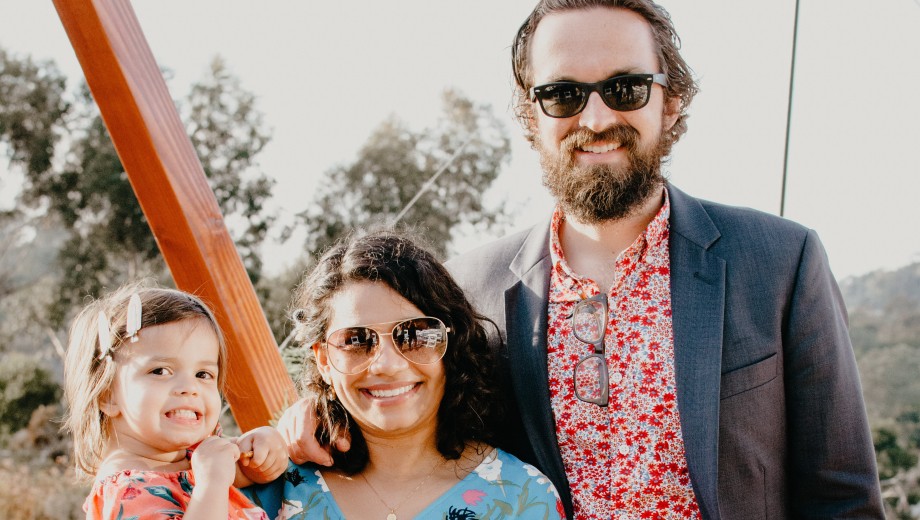The academic job market is stressful for everyone, but especially couples seeking elusive dual-career placements. Chandani Patel, PhD’15, and Brady Smith, AM’09, PhD’15, had a particularly complex case of the “two-body problem.” Though they were in different departments (Comparative Literature and English Language and Literature, respectively), they worked in the same area, African literature. “Our plan the whole time was, we’re both going to apply to the same jobs and double our odds of one of us getting it,” Patel says.
It worked: she got offered a tenure-track position. But Smith had a postdoctoral fellowship in Chicago, and Patel was newly pregnant. The idea of spending the entire pregnancy living apart was too much. Patel turned down the job and decided to look for a nonacademic position. Soon after, so did Smith.
Today, Smith teaches at Avenues: The World School, a pre-K through grade 12 school in Manhattan, and Patel is director for global diversity education at New York University. Both say their jobs draw on their graduate research—just in a different way than they expected.
Here, Smith and Patel tell Tableau how they approached their careers and what they learned along the way.
Because you had the same goals, I imagine you had to start thinking about your job search pretty early. What do you remember about those conversations?
Smith: Around 2012, when we were talking about getting married, we started to realize that our career track was probably going to be a little bit different than we thought. We were helped along by the fact that we started graduate school in 2008 and the assumptions everyone had about what a PhD student’s career would look like blew up. There was a massive contraction in tenure-track positions.
Patel: At the time, UChicagoGRAD was starting to do more career coaching for nonacademic jobs, so we had the sense that there were more possibilities out there. We weren’t yet ready to start exploring them, but we knew we were going to have to be nimble and start preparing for other possibilities.
Who did you look to for advice?
Patel: I don’t think there was anyone else in exactly the same situation. We were not only in the same field; we had the same dissertation committee. It made it tricky.
Smith: We were lucky in that our adviser had been in a similar situation—she married someone in the same field. There were also a lot of junior faculty in English who had experienced the job market recently, and they were super supportive of the idea that, even though you’re a grad student, you also have a whole life. Scholarship is not the be-all and end-all.
How do you feel your graduate work prepared you for what you do now?
Smith: One of the things I really like about Avenues is that it’s a school that begins with a question: What would it mean to be a world school? Teachers come here because they’re really interested in that concept. Having an inquiry-based background helps me work in a place where everything is open ended and experimental.
Patel: So much of the conversation right now is, how can we be more inclusive? How do we think beyond White heteronormative frameworks? How do we think about decolonizing the curriculum? My training in postcolonial studies factors into the ways that I think about that work. It also helps me ask what different possible worlds we can imagine. We both studied literature and those are the kinds of questions that the humanities allows us to ask.
You wrote about your job search experience for Inside Higher Ed in 2017. Were you nervous to talk publicly about leaving the traditional academic career path?
Patel: Things are a little different now, but at the time there weren’t that many people talking openly about the very personal decisions they were making. So for us, it was important to put it out there so that other folks understood that there is a choice about taking a tenure-track position. You don’t have to say yes.
What helped you as you navigated your path in and out of academia?
Patel: One thing that was really helpful for both of us was that we had opportunities to work part-time. We both worked at the Chicago Center for Teaching, in different roles. If you don’t have the opportunity to pursue anything outside of the work of an academic, then you don’t have a sense of other possibilities. I do think, across different industries, there is a need for folks who have PhDs in the humanities. It’s not that people should no longer get PhDs in the humanities, but rather that we need to think differently about the value of a PhD in humanities. There does need to be support for that, though, and we were very fortunate in that UChicagoGRAD did that work.
Smith: I have good memories of academia. I get nostalgic reading footnotes. I miss aspects of that work, even though I enjoy what I do now. But I think it’s important that people recognize that if you can manage a PhD program, you have an enormous amount of skills that go beyond what you see right in front of you.

